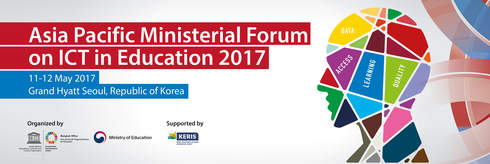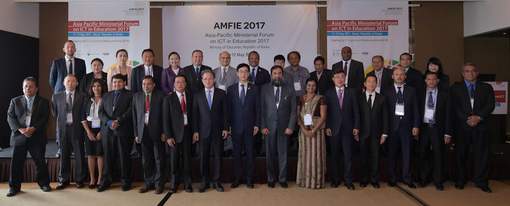Background
On 25 September 2015, the 70th UN General Assembly formally adopted 17 Sustainable Development Goals (SDGs) that will frame policies and programmes of Member States over the next 15 years. The SDG4 reaffirms education as a fundamental human right and a key catalyst for achieving wider development goals. It aims to “ensure inclusive and equitable quality education and promote life-long learning opportunities for all” through an integrated approach. This echoes the collective commitment of the international education community with the Education 2030 agenda, which was set out during the World Education Forum (WEF) held in Incheon, Republic of Korea in May 2015. The core premise of Education 2030 is to ensure comprehensive renewal of the education sector to build a lifelong learning society, targeting its development across all levels and areas, all the way from early childhood care and education to K-12 to vocational and tertiary education.
Notably, Education 2030 and its associated Framework for Action recognizes the immense potential of ICT in attaining the lifelong learning goal for all. It highlights the need for ICTs to “be harnessed to strengthen education systems, knowledge dissemination, information access, quality and effective learning, and more effective service provision”. As an immediate follow-up to WEF, the International Conference on ICT and Post-2015 Education Agenda, was held in Qingdao, PR China in May 2015. The forum discussed proactive sector-wide strategies to leverage the power of ICT to transform education, as well as to establish targets and benchmarks to coordinate global partnerships. The ensuing Qingdao Declaration underscores the potential of relevant ICT-based resources and solutions in providing access to lifelong learning opportunities, enhancing the quality of learning, supporting teacher innovations and knowledge-sharing, diversifying learning pathways and modalities, and enhancing the management of education systems.
It is in this context that UNESCO Bangkok, together with the Government of the Republic of Korea, co-organize Asia Pacific Ministerial Forum on ICT in Education (AMFIE) 2017 with the theme of “Shaping Up ICT-supported Lifelong Learning for All”, in Seoul, Republic of Korea on 11-12 May 2017. The Forum will bring together international experts and education policy makers in the region to revisit and refine the role of technologies for the Asia-Pacific Member States in achieving the Education 2030 agenda. Specifically, it aims to reach a high-level agreement on a regional strategy to unleash the potential of ICT to facilitate the achievement of SDG4.
Regional Strategy on using ICT to help achieve SDG4
AMFIE 2017 will be a great opportunity for education policymakers to deliberate and endorse the “Asia Pacific Regional Strategy on Using ICT to Facilitate the Achievement of Education 2030” (‘Regional Strategy’ from hereon), taking into account regional education priorities vis-à-vis diverse contextual realities among Member States. The Regional Strategy tentatively targets the next five years, with the 15-year long-term vision in mind. It aims to promote a more systematic and coordinated stakeholder engagement in aligning ICT in Education policies, programmes, and initiatives with regional and sub-regional educational priorities and targets. It will be inclusive, innovative, and empowering, with enough flexibility to acknowledge varying levels of development and capacity across the region.
Taking off from a situational analysis on the region’s widening disparities and foreseen challenges in achieving education targets, the Regional Strategy will identify priority action areas that can be best addressed with the use of ICT, including but not limited to the following:
- Unlocking the potential of ICT to improve access to education
- Enhancing the quality of learning toward developing core competencies for the 21st century
- Measuring the present and empowering a future
- Leveraging Smart Partnerships
Get more information on the proposed Regional Strategy from the Ministerial Forum Concept Note.
Forum Objectives
The Ministerial Forum aims to:
- Create opportunities to share policies, challenges, experiences, and innovations across countries in the Asia-Pacific region and beyond;
- Deliberate on the Regional Strategy and explore country-level support towards providing ICT-supported education opportunities and services that value inclusion, innovation, and empowerment, specifically by:
a. Identifying how ICTs can address issues related to access, diverse needs, lifelong learning, etc.;
b. Facilitating educational innovation and transformation through ICT;
c. Fostering a favourable ICT-supported learning environment to empower citizens; and
- Promote bilateral and multi-lateral collaborations and other forms of partnerships within the region towards the efficient and effective use of ICT in ed
Resources
Concept Note (pdf, 510kb)
Programme (pdf, 807kb)
- Session Descriptions (pdf, 805kb)
- Asia Pacific Regional Strategy on Using ICT to Facilitate the Achievement of Education 2030 (pdf, 503kb)
Administrative Note (pdf, 446kb)
Addendum to the Admin Note (pdf, 738kb)
AMFIE 2013 Outcome Document (pdf, 1.1mb)
AMFIE 2012 Outcome Document (pdf, 2.3mb)
Presentations
DAY 1
Keynote Presentation:
- Lifelong Learning for New Collar Workforces of the 4th Industrial Revolution (Mr. Paul Kim, Office of Innovation & Technology, Stanford Graduate School of Education, Stanford University, USA)
ICT and the Education 2030 Agenda
- Education Agenda 2030 and ICT (Mr. Gwang-Jo Kim, Director, UNESCO Bangkok) - pdf_2.2mb
- Evidence‐Based Policy and Practice in ICT‐Transformative Education (Mr. Wei Loong David Hung, National Institute of Education, Singapore) - pdf_7.1mb
- Smart Partnerships for Effective Education (Mr. Brajesh Panth, Technical Advisor for Education, Sector Advisory and Service Cluster, Sustainable Development and Climate Change Department, Asian Development Bank) - pdf_580kb
Ministerial Dialogue on the “Asia Pacific Regional Strategy on Using ICT to Facilitate the Achievement of Education 2030”
- Overview of the Regional Strategy (Ms. Jonghwi Park, Programme Specialist, UNESCO Bangkok) - pdf_550kb
DAY 2
Session 1-A: Using OER to Achieve SDG4
- Flipped learning using K-MOOC (Mr. Jinhyuk Im, Professor, Pohang University of Science and Technology) - pdf_2.1mb
- Practices of teaching and learning using OER (Ms. Hyejung Im, Teacher, Seoul Gangdong Elementary School) - pdf_1.03mb
- OER and Global Citizenship Education (Ms. Milee Ahn, Professor, Hanyang University) - pdf_3.95mb
Session 1-B: Education Innovation for the Fourth Industrial Revolution
- Enhancing Education Innovation and Cooperation through Use of ICT (Mr. SoonShik Suh, Professor, Chuncheon National University of Education) - pdf_3.5mb
- Software Education and Future Skills in the Fourth Industrial Revolution (Mr. Hyeoncheol Kim, Professor, Korea University) - pdf_717kb










